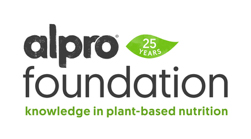SOY SERIES: Part 1 of 3
Why consider soy alternatives to dairy and meat:
Building a healthy, sustainable diet
Tuesday 14 June 2022
Webinar: 140 mins
SOY SERIES: Part 1 of 3
Why consider soy alternatives to dairy and meat:
Building a healthy, sustainable diet
Tuesday 14 June 2022
Webinar: 140 mins
Free
120mins
95mins
A GLOBAL EVENT FOR HEALTH PROFESSIONALS, POLICY MAKERS, ACADEMICS AND STUDENTS
This event is the part one of a special three-part webinar series on The Future of Soya for Health and Sustainability – Sharing Global Learnings. Soy has been part of the traditional Asian cuisine for centuries – and it is fast becoming an increasing part of the global diet. In this series, you will hear from internationally-acclaimed experts discussing the latest research across the globe and exploring the future of soy – for both health and sustainability.
Part one of the series provides an overview of the latest significant peer-reviewed research papers on soy, and why we should be including soy dairy and meat alternatives in a healthy sustainable diet for both adults and children.
It will look at the latest data on soy consumption, as well as opinion among research and nutrition professionals. You will learn how soy is being successfully promoted in ASEAN countries and how western countries might learn from this. The session will also explore the latest data on soy and muscle, with a focus on sarcopenia in relation to malnutrition and older adults. Finally, some of the latest research on soy beta-conglycinin and sports nutrition will be explored.
This webinar has been designed for
- Academics
- Industry professionals
- Policy makers
- Child health professionals
- Dietitians
- Nutritionists
- Other health professionals with an interest in this topic
The 140 minute webinar is running twice to enable as many people as possible around the world to join:
Screening one: 08:00 BST; 09:00 CET; 00:00 PDT; 01:00 EDT; 16:00 JST
Screening two: 16:00 BST; 17:00 CET; 08:00 PDT; 11:00 EDT; 01:00 JST
The webinar will include recorded lectures from the speakers; each will also answer audience questions, which you can submit in advance when you register. At each live session, Chair Tanya Haffner will be providing insights; nutrition expert with experience in soy Elphee Medici will also be available to address some live questions. A full question and answer document will also be provided to attendees after the events.
See part two (September) here.
Details of part three (November) of the series will be released closer to the live session.
Help us to continue providing expert nutrition learning
If MyNutriWeb has helped you deepen your knowledge of dietary and nutritional subjects, join us to help support and educate people to eat well for themselves and the planet. Read more...

Programme outline
Chair’s welcome
Tanya Haffner
CEO, Registered Dietitian, MyNutriWeb
Tanya Haffner's biography
Tanya is an Irish born, UK trained dietitian and nutritionist. She previously founded Nutrilicious Communications, the first solely dedicated nutrition communications agency in the UK, which has supported multiple change agents in food and health over 20 years. Now, the culmination of her mission to help everyone to eat well is the award winning MyNutriWeb.com, which uses all her experience and network, curating and running authentic influential learning and dialogue events, including traditional conferences, policy, networking, and training opportunities. Supporting and empowering all health professionals and other change agents in food with nutrition matters is in Tanya’s view, critical to improving citizens health whilst also helping to protect our planet. Tanya was awarded the Caroline Walker Trust Award for Freelance Nutritionist of the Year 2021 which recognises distinctive and outstanding work in promoting public health which maintains and advances the standards of food and nutrition. Tanya has recently taken up the role of chair of the BDA Sustainable diets group and is looking forward to working with the BDA to help advance the professions impact on sustainable eating.

Soy dairy alternatives for adults and children
Professor Ian Rowland
Emeritus Professor of Human Nutrition, University of Reading, UK
Professor Ian Rowland’s biography
Professor Rowland’s main research area is the impact of plant-based eating and phytochemicals on health, particularly cancer and cardiovascular disease. He has published over 400 papers and has an honorary doctorate from University of Gent for his work on nutrition and cancer. He is chair of the Alpro Foundation Scientific Advisory Committee.
Lecture outline and learning objectives
Plant-based eating is becoming increasingly popular for reasons of both health and sustainability. People wanting to reduce their intake of animal products need nutritious alternatives derived from plant materials. Soy-based alternatives to dairy milk, yogurt etc provide similar essential nutrients, but with a more healthful fat profile, health and sustainability benefits.
GAIN CLEAR UNDERSTANDING OF:
• Nutrient content of soy dairy alternatives
• Health benefits of soy products
• Environmental impact of soy-based foods
BE AWARE OF:
• Contribution of soy-based products to a healthful diet
• Soy components – especially isoflavones – and their role in human health
• Reduction in land use, greenhouse gas emissions, water use, of soy compared with dairy products
BE ABLE TO:
• Reach science-based decisions on the value of soy alternatives to dairy
• Describe impact of soy products on human health with reference to the scientific literature
• Discuss the environmental benefits of switching from dairy to soy

Promoting health in ASEAN people by integrating soy foods into the diet
Professor Shigeru Yamamoto
International Nutrition, Graduate School of Jumonji University
Professor Shigeru Yamamoto’s biography
Education
BS in Nutrition from Tokushima University; MS in Nutrition from Columbia University (Fulbright scholar); PhD in Nutrition from Tokushima University; PhD in Nutrition from Vietnam National Institute of Nutrition
Research has focused on public nutrition and published more than 500 articles in international and domestic journals and books
Other Supervision of more than 300 Japanese and international graduate students
Lecture outline and learning objectives
The number of cases of non-communicable diseases have dramatically increased in ASEAN (Association of Southeast Asian) countries in recent years. Heart disease and stroke are the leading causes of death in most of these countries, where diets high in fat and calories are common in Indonesia, and there is a low intake of dietary fibre in Vietnam. We carried out dietary interventions in Indonesia and Vietnam to examine the impact of soy-based meat alternatives on health. We found that a diet including soy-based meat alternatives had a positive impact on the subjects’ body weight, blood glucose levels and lipid concentration. We believe that changes in diet to include soy-based meat alternatives will be a useful approach to reducing the level of non-communicable disease in ASEAN countries.
GAIN CLEAR UNDERSTANDING OF:
• Diets in ASEAN countries may be a cause of the increase in non-communicable disease
• Soy-based meat alternatives can be used to replace animal meat in various traditional dishes
• Meat alternatives are easily accepted by consumers and this switch in diet could contribute to disease prevention
BE AWARE OF:
• Soy-based meat alternatives can be used as a tool to improve traditional diets
• Soybean protein has a positive impact on the control of blood lipid profiles
BE ABLE TO:
• Use soy-based meat alternatives as a dietary approach in helping to reduce obesity and non-communicable diseases

The role of soy in promoting muscle function
Dr Joan Trabal
Nutritionist, Department of Endocrinology and Nutrition, Hospital Clinic University of Barcelona, Spain
Dr Joan Trabal’s biography
Dr Joan Trabal is a reference dietitian-nutritionist for the Hepatology and the Gastroenterology Departments at the Hospital Clinic de Barcelona. Dr Trabal holds a PhD in nutrition from the University of Barcelona, where he is currently a clinical associate professor. His research interests lie in the interrelationship between undernutrition, sarcopenia and physical frailty in cirrhosis and ageing.
Lecture outline and learning objectives
Muscle mass decreases after 30 years of age, at an average rate of 15 per cent per decade after age 50, and 30 per cent per decade after age 70. Therefore, a significant proportion of older adults will experience sarcopenia. Studies have shown a positive relationship between dietary protein and muscle mass. Can soy protein help meeting the protein requirements as we age?
GAIN CLEAR UNDERSTANDING OF:
• The effects of sarcopenia in older people
• The process of anabolic resistance
• The importance of protein intake
BE AWARE OF:
• Changes in protein requirements as we age
• The synergistic effect of exercise and protein
• The role of soy protein in maintaining muscle
BE ABLE TO:
• Advise patients about the importance of protein intake as we age
• Counsel patients about the effectiveness of soy protein for improving muscle function
• Evaluate the evidence in support of soy protein as an effective protein for maintaining muscle function

Soybean beta-conglycinin as an effective food material for preventing dyslipidemia
Professor Mitsutaka Kohno
Department of Sports Science, Sports Nutrition Research Centre, Kyushu Kyoritsu University
Professor Mitsutaka Kohno’s biography
Professor of Kyushu Women’s University
Director of Sports Nutrition Research Centre, Kyushu Kyoritsu University
BS in Agriculture from Kyoto University (1986)
Joined Fuji Oil Co., Ltd. (assigned to Basic Research Division) (1986)
PhD in Agriculture from Kyoto University (2000)
Retired from Fuji Oil Co., Ltd. (2021)
Lecture outline and learning objectives
This lecture will highlight measures to improve health in Japan with a focus on metabolic syndrome. It will highlight the beneficial physiological effects of beta-conglycinin – the improvement of lipid and glucose metabolism – along with an outline of its mechanisms of action.
GAIN CLEAR UNDERSTANDING OF:
• Health promotion in Japan
• The control of blood glucose and lipid profiles
• Importance of inflammation suppression
BE AWARE OF:
• Recognition of Healthy Life Expectancy Extension
• How beta-conglycinin can contribute to the prevention of diabetes and dyslipidemia
• How beta-conglycinin has further potential for improving health
BE ABLE TO:
• Appreciate the role of beta-conglycinin in health promotion
• Understand the importance of food ingredients versus supplements
The lecture will be in Japanese with English subtitles

Elphee Medici, BSc, PGDip
Guest nutrition expert and moderator with experience in soy
Elphee Medici’s biography
Elphee Medici is a nutrition expert with over 30 years’ experience working in the NHS, industry and freelancing. She supports Nutrilicious as a Nutrition Communications Consultant on scientific and consumer communications relating to nutrition, health and sustainability – including soya. Core expertise includes critiquing scientific research, interpreting findings in context of practical implications and authorship of various evidence-based reports.
CPD CERTIFICATE & LEARNING MATERIALS
This webinar has been approved for CPD by the AfN

Webinar slides and links to other key resources will be sent within a week of viewing the live webinar, along with a separate personalised CPD certificate to save for your files. Add hello@mynutriweb.com to your safe senders to ensure you receive them.
This webinar is being run in association with Alpro Foundation and The Fuji Foundation for Protein Research
About Alpro Foundation
Alpro Foundation is an independent non-profit organisation that was founded in 1996 in order to support scientific research into nutrition and to promote knowledge and awareness of plant-based nutrition, health and sustainability. Various resources for academics, health professionals and students can be found on their website www.alprofoundation.org
About Fuji Foundation for Protein Research
Fuji Foundation for Protein Research was established to support soy protein research and thereby contribute to human health, nutrition and food sustainability.
The Fuji Oil Group established The Research Committee of Soy Protein Nutrition in 1979 in Japan to advance both basic research and applications knowledge relating to soy. This Committee was the forerunner of the Fuji Foundation for Protein Research, a Japan-registered charity that promotes research on plant protein, in particular soy.
Since 1991, the Foundation has made grants to Japan-based research groups investigating plant protein in 4 subject areas:
- Nutrition & health
- Functionality
- Plant cultivation
- Food culture
To date, these awards the focus has been on soy protein research. However, the Foundation plans to expand its activities to other plant proteins and offer grants to overseas researchers from 2023 onwards. English language website www.fujiproteinfoundation.org
Please note, approval of each sponsor and activity is carefully assessed for suitability on a case by case basis. Sponsorship does not imply any endorsement of the brand by MyNutriWeb, its organisers, its moderators or any participating healthcare professional, or their association. Sponsorship funds are reinvested into the creation and promotion of professional development opportunities on MyNutriWeb.
Popular Now

The Microbiome of IBD and CD

Type 2 Diabetes Prevention: An update on diet and lifestyle interventions

Reversing Type 2 Diabetes
Feature in a Webinar
Webinar guest experts encompass topics relevant to all professionals and change agents in food and health, across all health and business sectors.
Would you like to feature in a webinar, or propose a guest expert?
Sponsor a webinar
MyNutriWeb offers organisations and brands an opportunity to sponsor topics, gaining valuable insights into the viewpoints of professionals within a moderated environment. If there is a topic that you would like to support please get in touch to discuss.
This website is intended only for students or professionals working in food, nutrition and health. If this is you, please click to continue.





